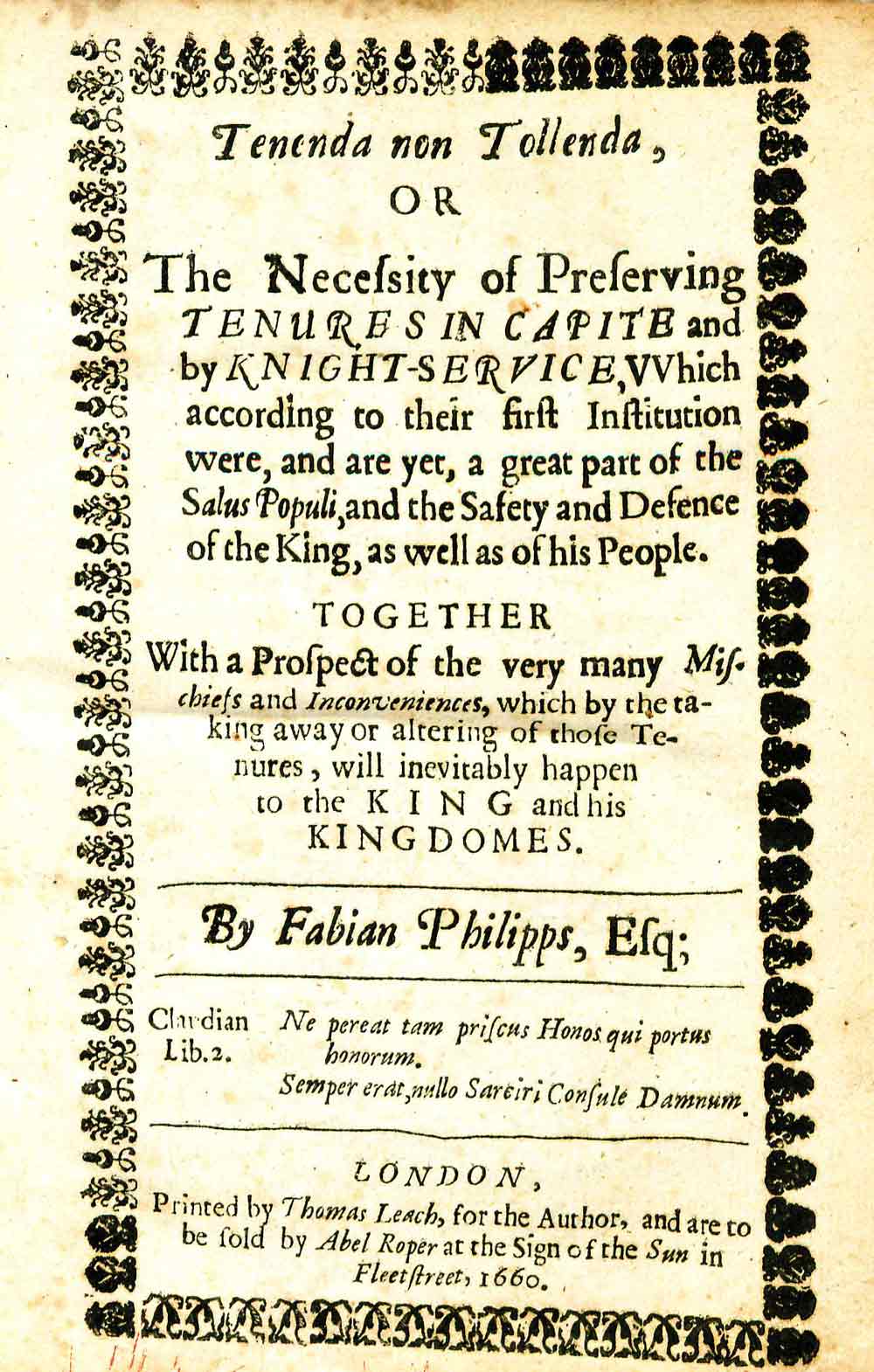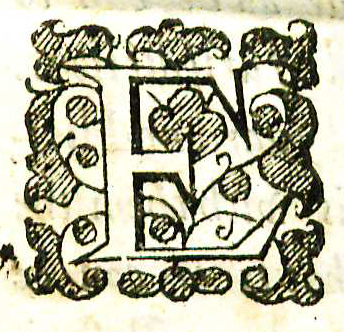Tenenda non tollenda, or The Necessity of Preserving Tenures in Capite and by Knightservice, which According to Their First Institution were, and are yet, a Great Part of the Salus Populi, and the Safety and Defence of the King, as well as of His People: Together with a Prospect of the Very Many Mischiefs and Inconveniences, which by the Taking Away or Altering of Those Tenures, Will Inevitably Happen to the King and his Kingdomes
by Fabian Philipps
| Tenenda Non Tollenda | |
|
Title page from Tenenda Non Tollenda, George Wythe Collection, Wolf Law Library, College of William & Mary. | |
| Author | Fabian Philipps |
| Published | London: Printed by Thomas Leach, for the author, and are to be sold by Abel Roper |
| Date | 1660 |
| Language | English |
| Pages | 7, 276 |
| Desc. | 8vo (19 cm.) |
| Location | Shelf E-1 |
When he was a youth, Fabian Philipps (1601 – 1690) attended one of the Inns of Chancery before eventually attending the Middle Temple.[1] It was during his time at the Middle Temple that Philipps developed a thorough understanding of the law.[2] After Philipps departed the Middle Temple he began to demonstrate a fiercely pro-royal philosophy.[3] He was so strong an advocate for the king’s prerogative, that two days before Charles I was beheaded, and despite the extreme unpopularity of Philipps' conduct, he drew up a protest against the "intended murder" of the king.[4]
After the restoration of Charles II, when the Bill for Abolishing Tenures was pending in Parliament, Philipps published Tenenda non Tollenda, a protest against the dissolution of tenure.[5] The title was one of three works written by Philipps on the abolition of tenures; the other two were Ligeancia Lugens, or, Loyaltie Lamenting the Many Great Mischiefs and Inconveniences which Will Fatally and Inevitably Follow the Taking Away of the Royal Pourveyances and Tenures in Capite (1661) and The Mistaken Recompense for Pourveyance and Tenures (1664).[6]
Evidence for Inclusion in Wythe's Library
Brown's Bibliography[7] includes a choice of the first edition (1660) of Fabian Philipps' Tenenda non Tollenda or the first edition (1661) of W. Phillips' The Principles of Law Reduced to Practice based on quotations in the manuscript copy of John Marshall's law notes "Joint Tenants & Tenants in Common: One deserved £100 to five equally to be divided between them & the survivors & survivor of them & if A (one of the five) died before marriage, her share to go over to another person, held a tenancy in common. Philips."[8] Brown notes that Tenenda Non Tollenda fits the subject matter of Marshall's quote better, but Thomas Jefferson owned a copy of The Principles of Law Reduced to Practice. Favoring the subject matter link over the Jefferson link, the Wolf Law Library purchased a copy of the Fabian Philipps' 1660 Tenenda non Tollenda.
Description of the Wolf Law Library's copy
Bound in later period-style calf with lettering piece and gilt fillets on the spine, dentelles to board edges and renewed endpapers. Purchased from The Lawbook Exchange, Ltd.
Images of the library's copy of this book are available on Flickr. View the record for this book in William & Mary's online catalog.
Full text
- Tenenda Non Tollenda (10MB PDF)
See also
References
- ↑ James Granger, "Biographical History of England" in A Biographical History of England: From Egbert the Great to the Revolution: Consisting of Characters Disposed in Different Classes, and Adapted to a Methodical Catalogue of Engraved British Heads: Intended as an Essay Towards Reducing Our Biography to System, and a Help to the Knowledge of Portraits: Interspersed with a Variety of Anecdotes, and Memoirs of a Great Number of Persons 5th ed. (London: Baynes, 1824), 129.
- ↑ Ibid.
- ↑ Ibid.
- ↑ Ibid.
- ↑ Ibid.
- ↑ Nicholas Jagger, "Philipps, Fabian (1601–1690)" in Oxford Dictionary of National Biography (Oxford University Press, 2004- ), accessed June 7, 2013.
- ↑ Bennie Brown, "The Library of George Wythe of Williamsburg and Richmond," (unpublished manuscript, May, 2012) Microsoft Word file. Earlier edition available at: https://digitalarchive.wm.edu/handle/10288/13433
- ↑ Ibid.

